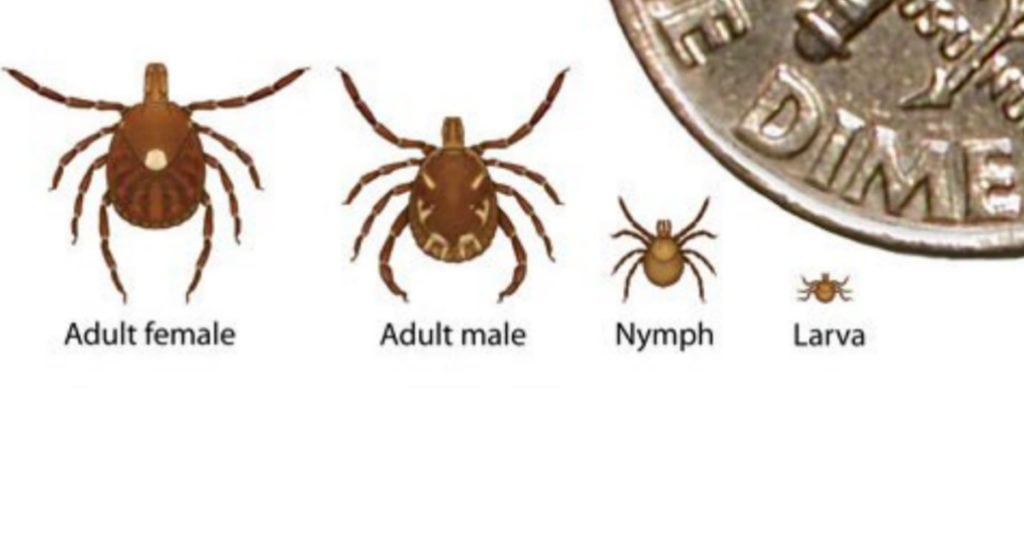
Sudden Red Meat Allergy Made Eating Painful For Mom And It's All Because Of A Tick Bite
July 09, 2019

A red meat allergy seemed to come out of nowhere and suddenly made eating painful for Janine Baumiller. And the cause is truly shocking. A lone star tick bite is behind all of the mom's agony!
Mother of two Janine Baumiller of Long Island, New York sits watching her family enjoy juicy burgers. But she can't take part herself. And it's all because of a red meat allergy she never had before.
RELATED: Grieving Family Cautions Others Of Tick Bites After Losing 2-Year-Old
All of a sudden, any time Janine ate red meat, she'd later break out in hives all over, as well as experience severe burning under her skin. But what was even more shocking than Janine's sudden reaction to red meat was why it was happening.
The allergy developed all because, at some point, Janine got bit by a lone star tick. A bite from this particular tick can activate an allergy to red meat, and in some cases, dairy, too.
WATCH: Lone Star Tick Bite Causes Red Meat Allergy
Janine now has to abstain from all red meat, sticking instead to poultry, fish, and veggies. And she's not alone.
Kristie Downen of Springfield, Missouri, had the same experience.
"Food started hurting. It got to the point where my stomach would swell up, I was vomiting," she said. "It's still unbelievable that a tick would make you allergic to food."
Experts call it the alpha-gal allergy and alarmingly, it's on the rise. Up from 3,500 cases three years ago, there are now 5,000 known cases just in the U.S.
“It does seem like it’s really growing,” said Dr. Scott Commins, allergist and associate professor at the University of North Carolina at Chapel Hill School of Medicine.
More On The Lone Star Tick
The alpha-gal allergy comes from a bite from the lone star tick -- “a very aggressive tick that bites humans” according to the Centers for Disease Control and Prevention.
“It appears the range of this tick is expanding," Dr. Commins went on to say. "I also think it’s driven by folks are just encouraged to go outside more and perhaps they have more tick bites.”
RELATED: Boy Miraculously Survives Bite From World’s Deadliest Spider
The lone star tick is primarily found in the southeastern and eastern U.S., but is also starting to move further north. A white spot on the back of the lone star tick is what helps distinguish it from other ticks.

Dr. Thomas Platts-Mills, of allergy and clinical immunology at the University of Virginia, is the one who helped make the link between the lone star tick and the alpha-gal allergy. He, too, was bit and suffers from the red meat allergy.
Dr. Platts-Mills believes we're seeing more of these ticks and the allergy it carries because of the increased deer population. A deer can carry up to 500 ticks and Dr. Platts-Mills says most of those are going to be the lone star tick.
“We’ve got deer on the lawns and they’re dropping these ticks everywhere,” Dr. Platts-Mills says.
Another interesting fact Dr. Platts-Mills points out is that most ticks are specific to a particular animal and prefer biting the animal to humans. But that's not the case for the lone star tick.
"The lone star tick really does like humans,” Dr. Platts-Mills said.
More On The Tick-Induced Red Meat Allergy
Experts aren't sure if the alpha-gal allergy is caused by one bite or multiple bites from a lone star tick. But they do know anyone can develop the reaction, even children.
Symptoms of the allergy often occur several hours after consuming red meat like beef, pork or lamb. Sometimes the allergy also includes a sensitivity to dairy, especially heavy-fat dairy like ice cream.
Someone suffering from the allergy can break out into hives, redness, itching and swelling, and even strong stomach cramping. Some can even have an anaphylactic reaction, which is life-threatening and requires the use of an Epi-pen.
The good news is the allergy typically goes away after two or three years. And those who suffer from it can still eat meat from fish, chicken, and turkey.
“If it swims or flies, it’s fine,” Dr. Commins said.
Doctors are also working on a vaccine, though it will be several more years before it's ready.
Expert Tips For Avoiding Tick Bites
- Ticks prefer heavier vegetation. So try to keep the grass in your yard from getting too tall. Avoid hiking or playing in heavily wooded areas as much as possible.
- Try to keep skin covered with long sleeves and pants when venturing into the woods or thick grasses.
- Try using a safe bug spray that repels ticks.
- After spending time outdoors, do a thorough check of both your clothes and body, then take a shower.
- Use a plastic baggie to save any ticks you find on your body, especially if you suspect you've been bitten. Look for the white dot on the back to identify a lone star tick.
- If you suspect you've been bitten, keep an eye out for symptoms and keep in mind the reaction from the red meat allergy occurs several hours after eating. Doctors can perform a simple blood test to confirm the allergy.
YOU MAY ALSO LIKE: Toddler’s Rash Is Result Of Rare Allergy That’s Still Stumping Scientists
Please be sure to share this story with others to raise awareness of the lone star tick and the red meat allergy.
h/t: Today
Featured Image: Youtube/Inside Edition
Today's Devotional
A Prayer When People Misunderstand You - Your Daily Prayer - March 7
What might God want to help you release so you can see Him more?
Top Music Videos

chris rupp Chris Rupp’s Beautiful A Cappella Cover of 'I Will Be Here'

Anne Wilson Anne Wilson 'Southern Gospel' Awe-Inspiring Live Performance

Universal Music Group Jonathan Traylor - Freedom In This House

GodTube Music bodie - Whisper and the Wind (Acoustic) || Live at GodTube Music Studio (Nashville, TN)

Riley Clemmons Riley Clemmons - Runs Deep
Blogs
At GodTube, you’ll find daily inspirational videos to lift your spirits and encourage you in your walk with God. Popular videos include worship music from your favorite Christian artists, cute videos with adorable kids and animals, hilarious videos from Christian comedians, user-uploaded videos, and clean viral videos to brighten your day.









